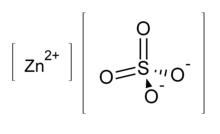Zinc supplementaion

Chemical model
|
|
| Clinical data | |
|---|---|
| Trade names | Solvazinc, Micro-Zn, others |
| AHFS/Drugs.com | Consumer Drug Information |
| Pregnancy category |
|
| Routes of administration |
by mouth, intravenous |
| Drug class | mineral supplement |
| ATC code | |
| Identifiers | |
|
|
| CAS Number | |
| PubChem CID | |
| DrugBank | |
| ChemSpider | |
| UNII | |
| ChEBI | |
| ChEMBL | |
| Chemical and physical data | |
| Formula | ZnSO4 |
| Molar mass | 161.47 |
| 3D model (JSmol) | |
|
|
|
|
Zinc sulfate is used medically as a dietary supplement. Specifically it is used to treat zinc deficiency and to prevention the conditions in those at high risk. This includes use together with oral rehydration therapy for children who have diarrhea. General use is not recommended. It may be taken by mouth or by injection into a vein.
Side effects may include abdominal pain, vomiting, headache, and feeling tired. While normal doses are deemed safe in pregnancy and breastfeeding, the safety of larger doses is unclear. Greater care should be taken in those with kidney problems.Zinc is an essential mineral in people as well as other animals.
The medical use of zinc sulfate began as early as the 1600s. It is on the World Health Organization's List of Essential Medicines, the most effective and safe medicines needed in a health system. Zinc sulfate is available as a generic medication and over the counter. The wholesale cost in the developing world is about 0.01 to 18 USD per day. In the United Kingdom ten days of treatment costs the NHS about 4.32 pounds.
The use of zinc sulfate supplements together with oral rehydration therapy decreases the number of bowel movements and the time until the children returns to normal in diarrhea. It general use in this situation is thus recommended by the World Health Organization.
...
Wikipedia
